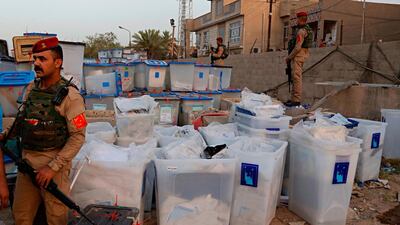Iraq will put on trial five election officials in connection with fraud, including vote buying, during the country's May legislative elections, a judicial official said on Saturday.
Judge Laith Hamza said the suspects were the heads of election offices in Salaheddin, Kirkuk and Anbar provinces as well as those who oversaw the voting in neighbouring Jordan and Turkey.
All five have been sacked "and will appear before the courts" in connection with allegations of fraud, Hamza said.
The decision to put them on trial has been taken following recommendations made by a ministerial committee, which issued a 28-page report after reviewing a series of complaints.
Hamza said the committee recommended they be tried after coming across election "violations, fraud and corruption" in the districts which the five suspects headed.
__________
Read more:
Ayatollah Ali Al Sistani calls for new Iraq government to be formed as soon as possible
The leaderless protests of southern Iraq see years of neglect boil over
Iraq PM looks to calm Basra unrest as demos spread
___________
According to the ministerial report, a copy of which has been seen by AFP, some of the alleged fraud involved "vote buying" on behalf of the Minister of Commerce Salman Ali and his brother Issam.
Iraq's May election were marred by allegations of fraud which prompted the supreme court to order a manual recount in several districts, including in the northern multi-ethnic city of Kirkuk.
The election was won by populist Shiite cleric Moqtada Sadr's joint list with communists, as long-time political figures were pushed out by voters seeking change in a country mired in conflict and corruption.
The results were contested mainly by the old guard.
The supreme court also ratified a decision by the outgoing parliament to dismiss Iraq's nine-member electoral commission and replace them with judges.
The ministerial committee additionally recommended in its report that a new law be passed to ensure that in the future independent judges – rather that an electoral commission – oversee elections.

